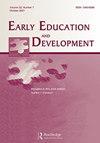The Mediating Role of Negative Parenting and Children’s Mastery Motivation on Socioeconomic Status and Chinese Preschoolers’ Problem Behaviors
IF 2.2
3区 教育学
Q1 EDUCATION & EDUCATIONAL RESEARCH
引用次数: 0
Abstract
ABSTRACTThis study examined the serial mediating effects of negative parenting and children’s mastery motivation on the relationship between family socioeconomic status (SES) and internalizing and externalizing problem behaviors in Chinese preschoolers. A sample of 669 Chinese children between 3 and 6 years (Mage = 4.83, SDage = 0.87, 50.4% girls) was recruited from 12 public kindergartens in a coastal city in southeastern China based on a stratified random sampling procedure. Their parents completed the Multidimensional Assessment of Parenting Scale (MAPS), Dimensions of Mastery Questionnaire for Preschool Children (DMQ 18), and Children’s Problem Behaviors Scale (CPBS). Research Findings: (1) family SES was significantly related to reduced negative parenting and children’s problem behaviors as well as increased children’s mastery motivation; (2) family SES affected children’s problem behaviors indirectly through the single mediating path of negative parenting and the single mediating path of children’s mastery motivation; and (3) negative parenting and children’s mastery motivation were identified the serial mediators between family SES and children’s problem behaviors. Practice or Policy: This study has demonstrated how family SES would interact with negative parenting practices concerning early childhood development. The findings also indicated that strategies that assist parents in adopting positive parenting practices or facilitate the development of mastery motivation in children might reduce the occurrence of children’s problem behaviors. Disclosure StatementNo potential conflict of interest was reported by the author(s).Additional informationFundingThis work was supported by the National Education Sciences Planning Fund of China [BDA210076].负性父母教养和儿童掌握动机对社会经济地位和学龄前儿童问题行为的中介作用
摘要本研究考察了负性父母教养和儿童掌握动机在家庭社会经济地位(SES)与学龄前儿童内化和外化问题行为关系中的系列中介作用。采用分层随机抽样方法,从中国东南部某沿海城市的12所公立幼儿园中招募了669名3 - 6岁的中国儿童(Mage = 4.83, SDage = 0.87, 50.4%为女孩)。父母分别完成了父母多维度评估量表(MAPS)、学龄前儿童精通程度量表(dmq18)和儿童问题行为量表(CPBS)。研究发现:(1)家庭经济地位与消极父母教养和儿童问题行为的减少显著相关,与儿童掌握动机的增加显著相关;(2)家庭社会经济地位通过负性父母教养和儿童掌握动机的单一中介路径间接影响儿童的问题行为;(3)负性父母教养和儿童掌握动机是家庭经济地位与儿童问题行为之间的串行中介。实践还是政策:这项研究已经证明了家庭经济地位如何与儿童早期发展的消极育儿实践相互作用。研究结果还表明,帮助父母采取积极的养育方式或促进儿童掌握动机的发展的策略可能会减少儿童问题行为的发生。披露声明作者未报告潜在的利益冲突。本研究得到国家教育科学规划基金资助[BDA210076]。
本文章由计算机程序翻译,如有差异,请以英文原文为准。
求助全文
约1分钟内获得全文
求助全文
来源期刊

Early Education and Development
Multiple-
CiteScore
5.50
自引率
10.30%
发文量
78
期刊介绍:
Early Education and Development (EE&D) is a professional journal for those involved in educational and preschool services and research related to children and their families: early education supervisors, school psychologists, daycare administrators, child development specialists, developmental and child clinical psychologists, and special education administrators. It is designed to emphasize the implications for practice of research and solid scientific information. The age range focused upon is preschool through the primary grades. EE&D is a connecting link between the research community in early education and child development and school district early education programs, daycare systems, and special needs preschool programs.
 求助内容:
求助内容: 应助结果提醒方式:
应助结果提醒方式:


